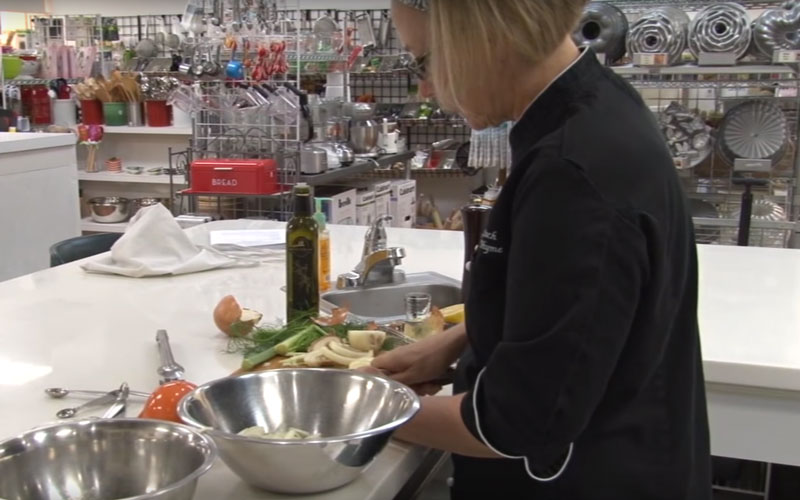
Lisa Brisch prepares a fennel slaw, a recipe she contribued to the farm-to-table cookbook.
(Photo by Chloe Nordquist/Cronkite News)
Local Arizona State University students, chefs, and dietitians are collaborating to help more families coping with food insecurity find and use local produce in healthy recipes.
The ten students in the service learning community development class at ASU came up with the idea of a Phoenix farm-to-table community cookbook titled “Let’s Eat Local”.
“What we decided to do was make a cookbook using local produce and teach the residents how to use that produce because a lot of the times when they’re given this free produce their not sure what to do with it and it goes to waste,” Ernest Garcia, a student in the class, said.
Nearly one in five households in Arizona with children were food insecure at some time in 2014, according to the United States Department of Agriculture.
The book will have 30 easy-to-make recipes that have healthy ingredients.The class chose the idea after learning that many residents are unfamiliar with the 80 or so local produce varieties.
“People with limited means who struggle to get food on the table, if they know how to cook they can cook healthier, they can save money,” Brisch said. “People are starting to not cook,” said Lisa Brisch, a personal chef and owner of Dinner Thyme, Inc.
Brisch contributed to the cookbook. She submitted recipes that can be done in a matter of minutes and use vegetables that some people may not be familiar with, such as fennel.
In the Phoenix area alone, there are several food deserts. The USDA defines these deserts as an urban area where it is difficult to buy affordable and quality fresh food.
“Everybody is concerned with this issue with the food deserts that everybody’s willing to get on board and contribute any way they can,” Garcia said. “We’re looking at more toward 1,000 books to distribute out into the local Phoenix area.”
The group of students behind the project will distribute the cookbooks for free to the communities between 16th Street and 19th Avenue and between McDowell Road and South Mountain. Cookbooks will also be given to the residents of the Salt River Pima Maricopa Indian Community.
The book will be printed in both English and Spanish. “It’s important that the cookbook is bilingual because there’s a huge sector of the community that is hungry, that doesn’t have English skills and they need this probably more than in English in some neighborhoods,” Monika Woolsey, MS, RD, owner of Hip Veggies and cookbook contributor, said.
The class has created a GoFundMe page to raise donations for printing costs. The cookbook itself is priced very similarly to what you’d pay for a photographic cookbook for the larger community as well.
“It’s not just about giving vegetables or food to people,” Woolsey said. “But it’s about giving them the knowledge or the skills that they might need to use that.”